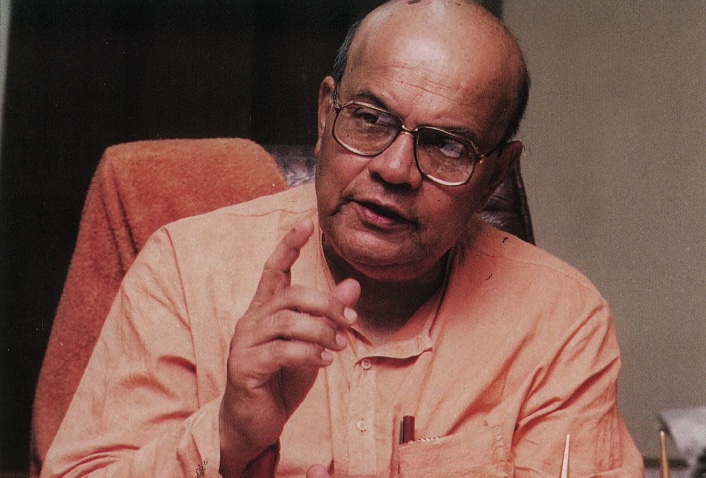By Rajiv Malik
I never expected to find six acres of manicured gardens five minutes from New Delhi Railway Station, but it is there, in the form of the Ramakrishna Mission. Lush green lawns, a huge meditation hall and temple startle the visitor who a moment ago was negotiating bumper-to-bumper traffic in the adjacent concrete jungle that is Punchkuian Road Market and the congested Paharganj neighborhood. Once inside, I was completely oblivious to the outside hustle and bustle. The peace and tranquility of the precincts is breathtaking, no less than heaven. A huge bookshop greets you on the left as you enter, and above this the high-tech office of mission head Swami Gokulananda, equipped with computers and copy machines and operating at a pace worthy of any corporate center, except here the work is for God and man. Just opposite the bookshop is the public library and a special study hall for students lacking sufficient space and quiet at home to study. There were perhaps a dozen swamis in evidence, talking among themselves or with the many visitors. By evening, the temple hall was filled with men, women and children who chanted mantras along with the priest as he performed arati before the white stone-carved murti of Sri Ramakrishna.
“I am a monk, a Hindu monk, belonging to the Ramakrishna Order,” began Swami Gokulananda, head of the Delhi Mission. He related to me how as a young student in 1947 at the Christian Missionary College in West Bengal, he invited Swami Sidheswarananda of RK Mission to speak to his class. “After the lecture, one student got up and said, ‘Swami, we have nothing to learn from you because you Hindus are all idol worshipers.’ Swami replied with a smiling countenance, ‘We believe we are not idol worshipers, but ideal worshipers.’ That was the beginning for me.” He joined the Order in 1954, and was eventually sent to the Khasi hills of Meghalaya to work among the tribals. There he learned the tribal language, and was so successful in keeping the tribals in the Hindu fold that jealous Christian missionaries in 1979 tried to blow up his quarters. Grateful tribals still visit him in Delhi.
Swami’s life today is a far cry from the hills of Meghalaya. He oversees a permanent monastic staff of ten monks who collectively run the temple, school, hospital, large tuberculosis clinic, mobile dispensary that travels to poor areas of the city, a homeopathic dispensary and more. There are regular classes, spiritual discourses and retreats. Devotees can also come for a day of silent meditation.
The free TB clinic is perhaps the largest project of this center. Though now treatable, TB remains rampant in India, causing 500,000 deaths each year. The clinic, which began in 1933 in a rented building with meagre funds, has grown into a sophisticated facility catering its services to millions of poor, needy and diseased during these 65 years. The RK Mission is part of the recent, dramatically expanded government program to control TB and has established centers servicing thousands in the Delhi area.
I sat down to talk to young Brahmachari Krishna, born in London and educated in India and America. “Why do you think I am here in this world?” he asked me. “Eating and drinking and merrymaking? All this seems to me absolutely foolish. I do not like to become a fool. I am not looking for temporary satisfaction. I am looking for eternal bliss.” “I am 19 years old,” he went on, “and I did my bachelor’s degree in business management. Before I came to the RK Mission, I was in great confusion. I came to Delhi intending to go to the Himalayas and meet the rishis, but someone suggested I meet Swami Gokulanandaji. I spent the night at the ashram and Swami gave me The Gospel of Sri Ramakrishna. I read it all at once that night. At that moment, I realized that my real goal was this only, to see God and to talk to Him.”
Swami Deshikatmananda, second in command at the mission, told a similar tale. Reading books by Vivekananda during college left him “burning with renunciation by my final year. Finally, I left hearth and home with the blessings of my parents and went to the RK Mission in Chennai.” He now oversees the center’s publications.
Future Delhi Mission plans include a new teaching facility for value-oriented education, Sanskrit and science. “We want our youngsters to be deeply rooted in spirituality,” Swami Gokulananda said. “Today they are badly imitating the Western culture, thanks to the evil effects of satellite television. They think that all that is Indian is bad. We also proposed to build up the hospital, but Belur Mutt headquarters said, ‘No, no, who will manage it? We are short of hands.’ So we have our limitations. People talk of shortage of commodities and all, but the true shortage is mainly of character.” I, for one, found no shortage of character among these excellent and dedicated monks.
